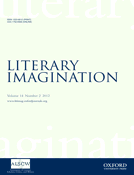
Literary Imagination
Scope & Guideline
Exploring the Depths of Literary Creativity
Introduction
Aims and Scopes
- Interdisciplinary Literary Analysis:
The journal emphasizes an interdisciplinary approach, integrating insights from history, philosophy, and cultural studies to enrich literary analysis and critique. - Exploration of Poetics and Form:
A consistent focus on the poetics of language and form is evident, with many articles analyzing the structural and stylistic elements that characterize significant literary works. - Historical and Cultural Contextualization:
The journal often situates literary texts within their historical and cultural contexts, examining how these factors influence interpretation and meaning. - Emphasis on Contemporary Literature:
Recent publications indicate a strong interest in contemporary literature, showcasing how modern themes resonate with or diverge from traditional literary motifs. - Thematic and Philosophical Inquiry:
The journal delves into thematic and philosophical inquiries, addressing complex issues such as identity, morality, and the human condition as represented in literature.
Trending and Emerging
- Post-Confessional Literature:
Recent interest in post-confessional literature highlights a shift in narrative style and subjectivity, exploring how authors navigate personal experiences without the constraints of traditional confessional forms. - Ecocriticism and Environmental Themes:
There is a growing trend towards ecocriticism, reflecting an increasing concern for environmental issues and how they are represented in literature, particularly in relation to climate change and ecological crises. - Digital Humanities and New Media:
The intersection of literature with digital humanities and new media is becoming a prominent theme, as scholars investigate how digital platforms influence literary production and reception. - Cultural Memory and Trauma Studies:
Emerging scholarship focuses on cultural memory and trauma, examining how literature reflects collective experiences of trauma and the ways in which narratives shape memory and identity. - Intermediality and Cross-Genre Exploration:
An emerging interest in intermediality and cross-genre exploration is evident, as authors engage with multiple forms of media and genres to analyze the interplay between literature, visual arts, and performance.
Declining or Waning
- Formalism and New Criticism:
There has been a noticeable decrease in articles that strictly adhere to formalist approaches or New Criticism, indicating a shift towards more contextual and interdisciplinary analyses. - Focus on Canonical Texts:
The journal seems to be moving away from a predominant focus on canonical texts and authors, as evidenced by the increasing attention to contemporary and diverse literary voices. - Traditional Gender Studies:
Traditional frameworks of gender studies appear to be waning, with fewer articles engaging in binary analyses or relying solely on feminist perspectives, as scholars explore more intersectional and nuanced approaches.
Similar Journals
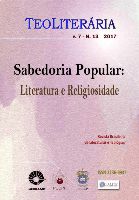
Teoliteraria-Revista Brasileira de Literaturas e Teologias
Fostering Dialogue Between Texts and TheologyTeoliteraria-Revista Brasileira de Literaturas e Teologias is a distinguished open-access journal published by the Pontifícia Universidade Católica de São Paulo (PUC-SP), dedicated to the interdisciplinary exploration of literature and theology. Since its establishment in 2011, this journal has been pivotal in fostering dialogue between literary studies and theological discourse, offering scholars a platform for innovative research and thought-provoking articles. With its ISSN 2236-9937, Teoliteraria prides itself on promoting academic rigor and diversity in scholarship, making it an indispensable resource for researchers, professionals, and students pursuing insights at the intersection of these rich fields. Located in São Paulo, Brazil, the journal is easily accessible to a global audience, underscoring its commitment to knowledge dissemination and scholarly collaboration.
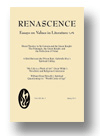
RENASCENCE-ESSAYS ON VALUES IN LITERATURE
Connecting Scholars Through the Lens of Literary ValuesRENASCENCE: Essays on Values in Literature is a prestigious scholarly journal published by Marquette University Press, dedicated to exploring the intricate relationship between literature and the human experience. With a focus on values as manifested in literary texts, this journal contributes significantly to the field of literature and literary theory. Despite its current status as a Q4 journal as per the 2023 category quartiles, it serves as a vital platform for interdisciplinary dialogue, drawing together a diverse range of voices from seasoned scholars to emerging researchers. Operating without open access, it invites subscription and institutional support to maintain its dedication to high-quality scholarship. The journal's ISSN is 0034-4346 and its E-ISSN is 2329-8626, ensuring both print and digital access to its rich collection of essays and critical analyses. As it converges towards its next milestone in 2024, RENASCENCE continues to engage with the fundamental values that literature imparts, fostering a deeper understanding of texts that resonate within our contemporary societal framework.

Taller de Letras
Elevating the Study of Letters and Literary ThoughtTaller de Letras is a renowned academic journal published by the Pontificia Universidad Católica de Chile, specifically from the Faculty of Letters. With an ISSN of 0716-0798, this journal holds a significant position in the field of Literature and Literary Theory, enjoying a commendable Q2 quartile ranking as of 2023. It operates under the auspices of a prestigious institution, promoting high-quality scholarly discourse within its scope, which spans a wide array of literary studies. Although the journal does not offer Open Access, its contributions are pivotal for researchers, professionals, and students seeking to enhance their understanding of contemporary literary trends and theories, establishing a critical dialogue within the literary community. With coverage extending through a converged lifespan from 2011 to 2024, Taller de Letras continues to be a valuable resource for those engaged in the vibrant fields of literature and criticism.

Vestnik Sankt-Peterburgskogo Universiteta-Yazyk i Literatura
Cultivating Knowledge at the Confluence of Language and LiteratureVestnik Sankt-Peterburgskogo Universiteta-Yazyk i Literatura, published by ST PETERSBURG UNIV PRESS, stands as a pivotal academic journal in the fields of linguistics and literature, reflecting a profound commitment to the exploration of language and literary theory. With an ISSN of 2541-9358, this journal has steadily built its reputation since its inception in 2017, achieving impressive rankings in Scopus that place it within the top tiers of its categories—Q2 in Linguistics and Language and Q1 in Literature and Literary Theory as of 2023. The journal serves as an essential platform for researchers, professionals, and students who are keen to delve into the complex interactions between language and literature. Although currently not offering Open Access, its contributions are invaluable to advancing scholarly dialogue and fostering understanding within these vibrant fields. With a converged publication timeline extending through 2024, Vestnik Sankt-Peterburgskogo Universiteta-Yazyk i Literatura exemplifies the ongoing commitment to high-quality research and critical thought, making it an indispensable resource for those dedicated to the study of language and its literary manifestations.

INFINI
Shaping the Future of Literary AnalysisINFINI is a distinguished academic journal published by EDITIONS GALLIMARD, focused on the fields of Literature and Literary Theory. With a commitment to advancing scholarship, INFINI provides a platform for innovative research and critical discourse, contributing significantly to the literary discourse landscape since its inception. The journal, which has achieved a Q3 ranking in the 2023 category of Literature and Literary Theory, aims to foster a deeper understanding of literary texts, contexts, and theories through rigorous analysis and scholarly dialogue. Though it currently does not offer open access, INFINI remains an essential resource for researchers, professionals, and students dedicated to exploring the complexities of literature. By continuously publishing thought-provoking articles, INFINI plays a crucial role in shaping the future of literary studies. For more information or to submit your work, you can reach out to them at their address in Paris, France: 5 RUE SEBASTIEN-BOTTIN, 75328 PARIS, CEDEX 07, FRANCE.

GERMANISCH-ROMANISCHE MONATSSCHRIFT
Connecting Cultures through Scholarly ExplorationGERMANISCH-ROMANISCHE MONATSSCHRIFT, published by UNIVERSITATSVERLAG C WINTER HEIDELBERG GMBH, is a vital academic journal dedicated to the fields of linguistics, literature, and literary theory. With its ISSN 0016-8904, this journal fosters scholarly discussions and disseminates innovative research that intersects Germanic and Romance languages and literatures. While it does not currently offer Open Access options, its contributions have positioned it within the Q4 quartile in both Linguistics and Language, and Literature and Literary Theory according to the 2023 category rankings. The journal's Scopus ranking reflects its emerging place within the academic community, situated at the 40th percentile for Literature and Literary Theory, and the 20th and 18th percentiles within Language and Linguistics, respectively. Scholars and students are encouraged to engage with this resource as it offers a platform for new perspectives that are pivotal to understanding the complex interrelations of these linguistic traditions, enriching both teaching and research initiatives.

Law & Literature
Transforming Legal Narratives into Literary Critique.Law & Literature, published by Routledge Journals, Taylor & Francis Ltd, is a pivotal journal at the intersection of legal studies and literary analysis. With an ISSN of 1535-685X and an E-ISSN of 1541-2601, this journal caters to a diverse audience, including researchers, practitioners, and students interested in the complexities of law and its representation in literature. Operating from the United Kingdom, it has made significant contributions to the field since its inception in 1989 and continues to thrive with contributions that explore the dynamic relationship between legal narratives and literary texts. Though classified in the Q4 quartile in Law category and holding a Scopus rank of 564 out of 1025, its unique focus ensures it remains a critical resource for understanding how narrative shapes legal discourse. While not an open access journal, its objective is to facilitate interdisciplinary dialogue by presenting innovative scholarship that probes the legal implications of literary works, thereby enriching both fields. For those invested in the paradigm of law through a literary lens, Law & Literature stands as a vital platform for engaging discussions and influential insights.

LITTERATURES
Innovating Insights in French and International LiteratureLITTERATURES is a distinguished academic journal dedicated to the exploration of literature and literary theory, published by UNIV TOULOUSE MIRAIL. With its ISSN 0563-9751, this journal provides a platform for innovative research and critical analysis in the humanities, particularly within the field of literature. Although currently not indexed with an official e-ISSN and with a history of coverage discontinued from Scopus from 2004 to 2015, LITTERATURES continues to contribute valuable insights and scholarly discourse in contemporary literary studies. Researchers will find its publications vital for examining the intersections of literary theory and practice, while students and professionals can benefit from its rigorous academic contributions. While the journal's Scopus rank places it within the 14th percentile among literature journals, its focus on French and international literature enriches the global literary landscape and encourages meaningful scholarly exchange. The journal is based in Toulouse, France, and invites contributions that challenge existing paradigms and inspire new interpretations within the realm of literature.
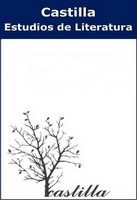
Castilla-Estudios de Literatura
Fostering Global Conversations in Literature.Castilla-Estudios de Literatura is an esteemed academic journal published by EDICIONES UNIV VALLADOLID, dedicated to the exploration and analysis of literature and literary theory. With an ISSN of 1989-7383 and an E-ISSN of 1989-7383, this journal has provided Open Access content since 2009, ensuring wide accessibility to its scholarly materials. Hailing from Spain, specifically based at JUAN MAMBRILLA 14, VALLADOLID 47003, SPAIN, it has become a notable platform for researchers and scholars, achieving a respectable Q3 ranking in the 2023 category of Literature and Literary Theory, along with a Scopus rank of #637 out of 1106 in the Arts and Humanities. Covering a converging period from 2013 to 2024, this journal embraces a diverse range of literary analysis, aiming to foster critical discourse among academics, professionals, and students globally. Its commitment to high-quality research and open dissemination makes it an invaluable resource for those engaged in the literary field.
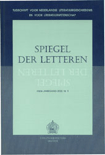
SPIEGEL DER LETTEREN
Advancing Scholarship in Literature and TheoryWelcome to SPIEGEL DER LETTEREN, a distinguished journal published by PEETERS in Belgium, with an impressive Q1 ranking in Literature and Literary Theory. Since its inception in 1996, this journal has been at the forefront of literary scholarship, engaging researchers, professionals, and students in profound discussions and analysis of literary texts, theories, and cultural contexts. Although it does not currently offer open access, its rigorous editorial standards ensure that each published work contributes significantly to the field, promoting the advancement of knowledge and understanding in literature. With an established reputation, SPIEGEL DER LETTEREN serves as a vital resource for those seeking to explore the nuances of literary studies, supported by a diverse range of articles that reflect both contemporary and historical perspectives.